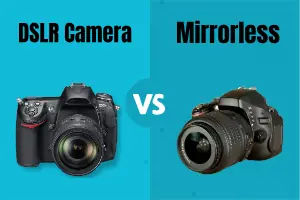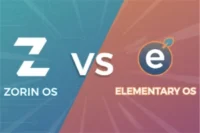Noise-Canceling vs Noise-Isolating Headphones
Published: 28 Nov 2024
Have you ever tried to listen to your favorite music but couldn’t because of all the noise around you? Maybe the sound of a busy street or people talking nearby made it hard to hear.
This is where noise-canceling vs noise-isolating headphones come in! They both help reduce outside sounds, but they do it in different ways.
In this article, we’ll look at what makes noise-canceling and noise-isolating headphones unique so you can decide which type might be best for you!
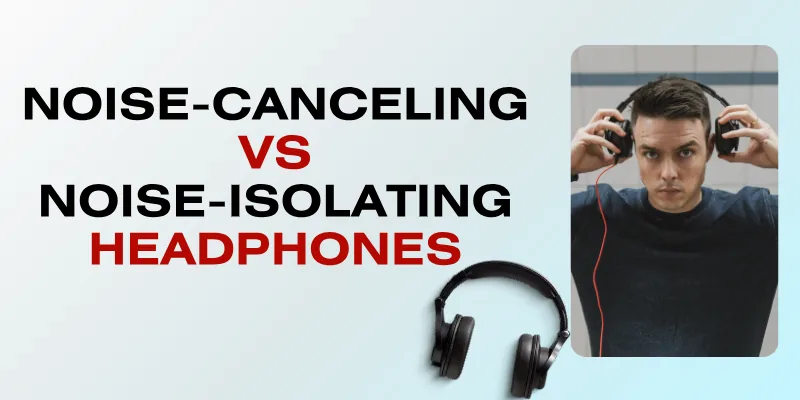
What Are Noise-Canceling Headphones?
Noise-canceling headphones are a type of headphones that use special technology to block out unwanted sounds from the environment.
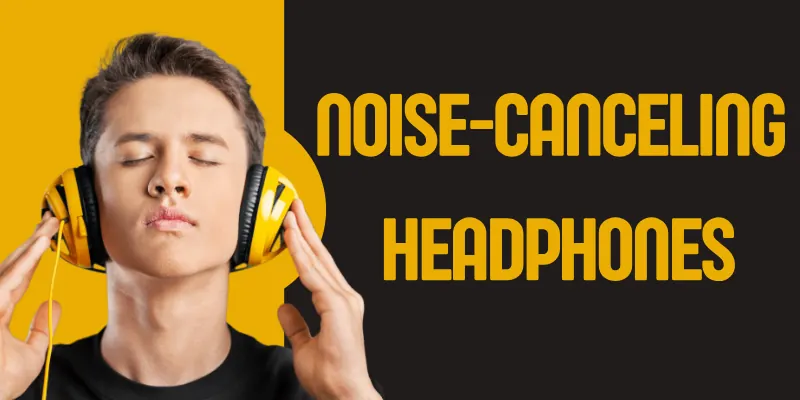
How They Work
- Active Noise Cancellation (ANC): These headphones have a tiny microphone that listens to outside sounds and then creates an opposite sound wave to cancel it out.
- Blocking Low-Frequency Noise: Noise-canceling headphones work best with low, steady sounds, like the hum of an airplane or air conditioner.
- Powered by Batteries: Most noise-canceling headphones need batteries to power the ANC technology.
- Not Effective for Sudden Noises: Sudden, loud sounds like clapping or shouting may still be heard.
- Ideal for Travel: These headphones are great for people who travel a lot, especially on airplanes.
What Are Noise-Isolating Headphones?
Noise-isolating headphones are designed to physically block outside sounds by sealing around or in your ears.
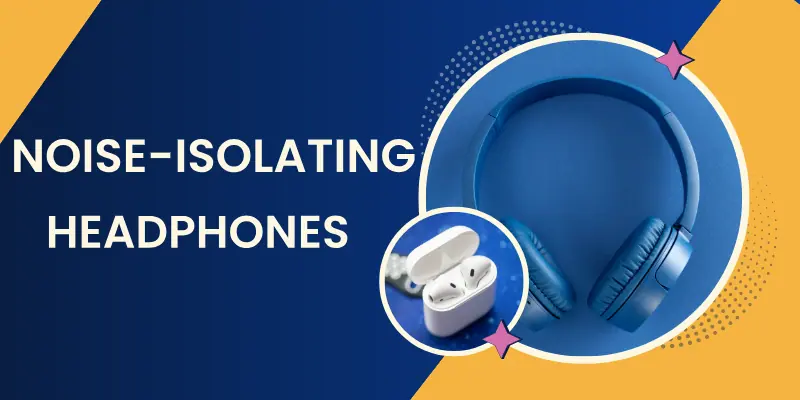
How They Work
- Passive Noise Isolation: Instead of using technology, these headphones rely on their shape and fit to block noise.
- Covers Your Ears: Over-ear and in-ear designs both help to seal out sound by covering your ears.
- No Batteries Needed: Noise-isolating headphones don’t need any power source since they work through design alone.
- Better for Sudden Sounds: These headphones are more effective against unpredictable sounds, like people talking nearby.
- Great for Everyday Use: They are excellent for daily activities like studying or working in quiet places.
Differences Between Noise-Canceling and Noise-Isolating Headphones
Noise-canceling vs noise-isolating headphones may seem similar, but they have some important differences.
Let’s explore the differences between these two amazing types of headphones in a simple and fun way!
Technology
Noise-Canceling Headphones: These headphones use a special technology called Active Noise Cancellation (ANC). They have tiny microphones that listen to outside noise and cancel it out.
This means you hear less background noise, like airplane engines. They create a quiet, peaceful experience even in noisy places. Think of them as little magicians that make noise disappear!
Noise-Isolating Headphones: These headphones don’t use any fancy technology. Instead, their design blocks outside noise by covering your ears well.
They rely on snug ear cushions or earbuds to keep sounds out. No extra features—just good old-fashioned sound isolation. Imagine wearing a cozy blanket for your ears to keep noise away!
Power
Noise-Canceling Headphones: They need batteries or charging to power the ANC feature. Without power, the noise-canceling won’t work, but you can still use them.
They have buttons to turn noise cancellation on or off. Power is essential for their high-tech magic to work. Think of them as headphones with a secret superpower!

Noise-Isolating Headphones: These headphones don’t need batteries or charging at all. They work as soon as you put them on or in your ears. No buttons, no charging, just simple and reliable.
They’re always ready to use whenever you need them. Noise-isolating headphones are like your always-on best friend!
Best for Low or Sudden Sounds
Noise-Canceling Headphones: These headphones are great at blocking steady noises, like engine sounds. Perfect for long flights or train rides with constant background noise.
They create a calm environment for relaxing or focusing. Not as effective for sudden, loud noises like a clap or shout. Noise-canceling headphones are like shields against droning sounds.
Noise-Isolating Headphones: They’re better at reducing sudden, sharp sounds. Great for blocking everyday noises, like people talking or car horns. They don’t need technology to work—just their snug fit.
Not as effective for very low, steady background noises. Noise-isolating headphones are like quick protectors against sudden interruptions!
Price Range
Noise-Canceling Headphones: These headphones are usually more expensive because of their technology. They cost more but offer advanced features like ANC.
A good choice if you travel a lot or need peace in noisy places. Worth the price if you want the best in sound quietness. Noise-canceling headphones are like a premium treat for your ears!

Noise-Isolating Headphones: These are usually less expensive since they don’t use advanced tech. Affordable and perfect for casual music listeners.
You get good noise blocking without spending too much. Ideal for everyday use without breaking the bank. Noise-isolating headphones are like a budget-friendly buddy!
Travel vs Everyday Use
Noise-Canceling Headphones: Perfect for long journeys, like flights or train rides. They block out annoying sounds, so you can relax. Great for people who need focus in busy, noisy places.
A must-have for travelers who want quiet time. Noise-canceling headphones are like travel companions for peace!
Noise-Isolating Headphones: Ideal for everyday use, like walking, studying, or casual listening. Easy to carry and use without worrying about charging. Perfect for enjoying music or podcasts during daily tasks. Great for short outings where you don’t need fancy features. Noise-isolating headphones are like your everyday heroes!
This comparison helps you see how each type of headphone is special in its own way. Whether you’re looking for high-tech quiet or simple noise blocking, there’s a perfect choice for everyone!
Pros of Noise-Canceling Headphones
Noise-canceling headphones have many benefits, especially for people who need a quiet environment.
| Benefits |
|---|
|
Cons of Noise-Canceling Headphones
Even though noise-canceling headphones are great, they do have a few downsides.
| Drawbacks |
|---|
|
Pros of Noise-Isolating Headphones
Noise-isolating headphones also offer many great benefits, especially for people who don’t need active noise cancellation.
| Benefits |
|---|
|
Cons of Noise-Isolating Headphones
There are some downsides to noise-isolating headphones as well, especially compared to noise-canceling models.
| Drawbacks |
|---|
|
When to Choose Noise-Canceling Headphones
Choosing the right type of headphones depends on where you’ll be using them most.
Ideal Situations for Noise-Canceling
- Traveling: Perfect for long flights, trains, or bus rides where background noise is constant.
- Working in Noisy Spaces: Great for people who work in busy places, like coffee shops or offices.
- Focus Time: Excellent for when you need to concentrate, like studying or working on a project.
- Music Lovers: If you want to hear every note in your music without interruption.
- Fans of Tech Gadgets: If you enjoy high-tech features like voice control, noise-canceling headphones offer more options.
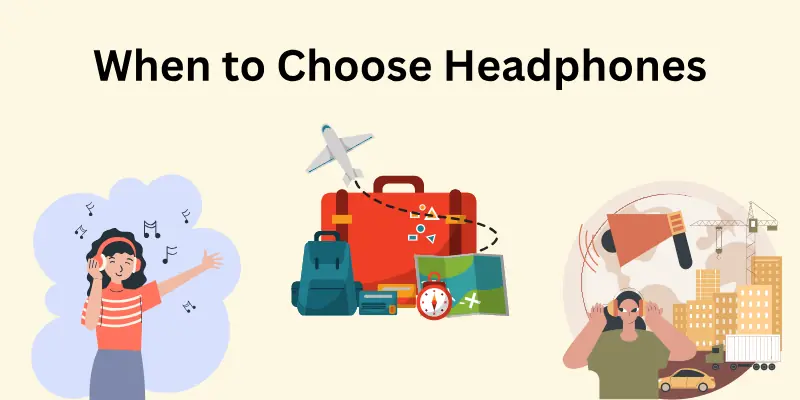
When to Choose Noise-Isolating Headphones
Noise-isolating headphones are a better choice for specific situations and types of users.
Ideal Situations for Noise-Isolating
- Everyday Use: Perfect for regular activities like studying, commuting, or casual listening.
- Budget-Friendly Option: Ideal for those who want good sound isolation without spending too much.
- Battery-Free Listening: Great for people who don’t want the hassle of charging batteries.
- Lightweight and Portable: Best for people who prefer lighter, more compact headphones.
- Unpredictable Sound Environments: Good for blocking sudden sounds like talking or loud city noises.
Which Type is Right for You?
When deciding between noise-canceling and noise-isolating headphones, consider your personal needs and preferences.

Things to Consider
- Budget: Noise-canceling headphones are more expensive, while noise-isolating ones are more affordable.
- Listening Environment: Think about where you’ll be using them most — noisy places or quiet areas.
- Comfort: If you wear headphones for long hours, choose a model that feels comfortable.
- Battery Requirements: Noise-canceling headphones need charging, while noise-isolating ones do not.
- Sound Quality: Noise-canceling headphones usually offer better sound quality due to their technology.
Conclusion
Both noise-canceling and noise-isolating headphones help you enjoy your music and block out unwanted sounds, but they do it in different ways. Noise-canceling headphones use advanced technology to cancel out low, constant noises, making them ideal for travel or noisy places.
Noise-isolating headphones, block sound by design, making them a great choice for everyday use without the need for batteries. Choose the right type depends on your lifestyle and listening needs.
Whether you choose noise-canceling or noise-isolating, you’ll be able to enjoy your music or podcasts with few distractions!
FAQs About Noise-Canceling & Noise-Isolating:
Here are the most FAQs related to Noise-Canceling vs Noise-Isolating:
Noise-canceling headphones use technology, while noise-isolating ones rely on design to block noise.
Yes, most noise-canceling headphones need batteries to power the ANC feature.
Noise-isolating headphones are useful but less effective in very loud travel environments.
Noise-isolating headphones are generally better for blocking sudden, high-pitched sounds.
Yes, if you need to block out steady noises, they offer better sound quality and comfort.
No, they mostly rely on design, so they lack features like Bluetooth or custom settings.
No, they work best with low, continuous sounds but may let sudden sounds through.
Comfort varies, some may cause discomfort with long use, depending on the design.
Noise-isolating headphones are usually more budget-friendly.
Yes, both improve sound quality, but noise-canceling headphones tend to do it better.

- Be Respectful
- Stay Relevant
- Stay Positive
- True Feedback
- Encourage Discussion
- Avoid Spamming
- No Fake News
- Don't Copy-Paste
- No Personal Attacks

- Be Respectful
- Stay Relevant
- Stay Positive
- True Feedback
- Encourage Discussion
- Avoid Spamming
- No Fake News
- Don't Copy-Paste
- No Personal Attacks

